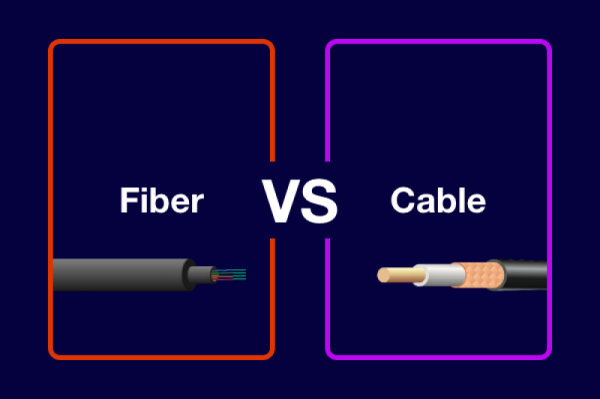Fiber and cable are both reliable, popular choices for home internet service. As a rule of thumb, fiber is usually the best performing connection type, although it may be more expensive depending on the providers in your area. Fiber provides much stronger upload speeds and more reliable connection speeds. Cable offers wider availability, affordable TV bundles, and in some cases faster installation if you want to use your own modem and/or router.
Is fiber or cable internet faster?
Our pick for speed: fiber internet
Fiber and cable internet can both reach download speeds up to 1,000 Mbps. The speeds offered where you live will vary by the providers available and the internet plan you choose. While both fiber and cable internet can reach the same speed, fiber is going to be the more reliable connection. Fiber internet is wired straight to your house, which means you don’t have to share your bandwidth with the neighbors. On the other hand, cable internet connects your home to a local central node that provides internet to the whole neighborhood. This means that you might not get the speeds advertised by your provider during busy internet hours.
Fiber internet also tends to offer faster upload speeds than cable internet, reaching up to 1,000 Mbps as well. Upload speed is important if you work from home and make frequent conference calls or upload videos and other files online. Overall, when it comes to speed fiber-optic internet is going to be your fastest option.
Fiber vs. cable internet: which connection is more affordable?
Our pick for price: cable internet
Cable Internet | Fiber Internet | |
|---|---|---|
Typical Plan Prices | $30 to $120 per month | $40 to $140 per month |
Average Download Speed | 25 Mbps to 1,000 Mbps | 100 Mbps to 1,000 Mbps |
Nationwide Availability | 89% Coverage | 25% Coverage |
Data Limits | 50 GB to Unlimited | 1 TB to Unlimited |
Overall, cable is usually a cheaper option than fiber. Fiber-optic technology is much newer than cable, so it tends to be pricier. If price is your main concern, we recommend cable internet. However, if you’re looking for more value, fiber internet typically offers a lower cost per megabit. Cable internet plans usually still offer plenty of speed for the average user, so if cheap internet is your main concern, go with cable.
How much do equipment and installation cost for Fiber and cable internet?
Our pick for equipment and installation: cable
The cost for installation and equipment really varies by provider and location. However, fiber-optic installation tends to be more expensive and time-consuming overall. Fiber is wired directly to your home. This means that you’ll have a very reliable connection, but it also means that you’ll need those fiber lines installed directly to your home. If a previous resident at your home has had fiber internet installed, those lines are already established and you won’t have to deal with it. On the other hand, if you’re the first resident to get fiber internet, they will have to be installed by your fiber internet provider either underground or strung across telephone wires. This can be costly and may take a few days to complete.
With cable internet, the lines aren’t installed directly to your house, so the installation process isn’t as extensive. If your residence has an established cable connection, you’ll just need to have a modem installed. Some cable providers offer discounted or free DIY installation, so you can save money and install your internet on your own. If the cable internet provider requires professional installation it will be a little more costly. Both fiber and cable internet require a modem, which is equipment that can be rented or purchased from your provider. If you’re renting, it will cost around $10 a month. For those who would rather purchase the equipment, it should cost no more than $100.
Where are Fiber and cable internet available?
Our pick for availability: cable internet
Cable internet has been around much longer than fiber-optic internet, so it is much more widely available across the country. Fiber internet has 25 percent nationwide coverage while cable internet covers about 89 percent of the country. If fiber isn’t available in your area, don’t worry! The technology is spreading rapidly as it is in high demand, so fiber internet might be available soon in your area. The quickest way to find out if cable or fiber internet are available to you is to use our search by zip code tool.
The pros and cons of Fiber and cable internet
Fiber Internet | Cable Internet | |
|---|---|---|
Pros |
|
|
Cons |
|
|
Data caps for fiber and cable internet
Our pick for data caps: fiber internet
Depending on the provider that you choose, your cable internet plan might come with data caps. This means that you’ll be given a certain amount of data to use each month. After reaching your limit, your speeds will be throttled or you’ll have to pay a data overage fee for any additional data used that month. These data caps can vary anywhere from 50 GB to 1 TB. Many cable internet providers also offer unlimited data on their plans. Data caps are a lot less common with fiber internet. If a fiber-optic internet provider does impose data limits, they are a lot higher than cable internet caps, starting at around 1 TB. That is plenty of data even for heavy-duty internet users. Overall, fiber internet is our pick when it comes to avoiding data caps.
The verdict: fiber or cable internet?
Fiber internet beats cable when it comes to speed and data caps, while cable internet wins out for price, availability, and installation and equipment costs. If you’re looking for the fastest, most reliable connection with unlimited data, fiber internet is going to be your best bet hands down. If you’re more interested in a standard, cheaper internet plan, cable internet is the option for you. To find out which fiber-optic internet and cable internet providers are available in your area, use our search by address tool.


